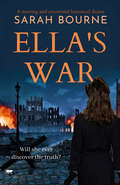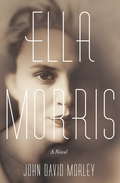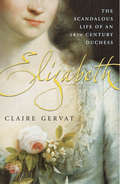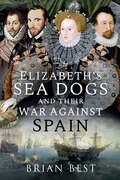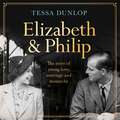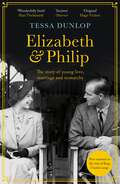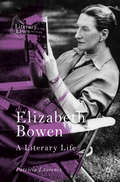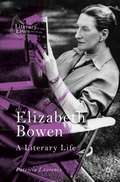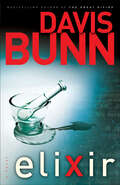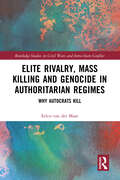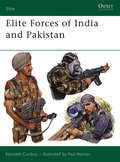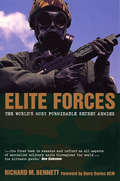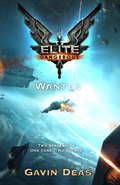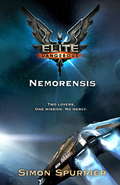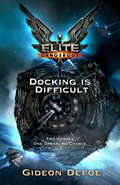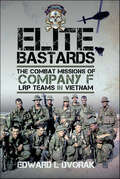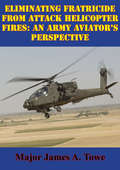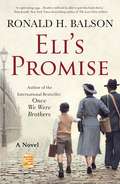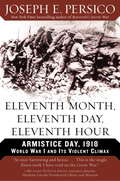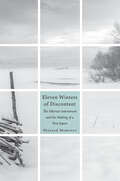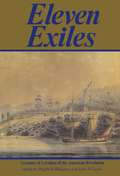- Table View
- List View
Ella's War: A Moving and Emotional Historical Drama
by Sarah BourneA World War II nurse finds herself in a hospital bed with no memory of how she got there in this dramatic historical novel by the author of The Train.1947. Ella Elkington wakes up in hospital with minor physical injuries but no memory. She cannot even remember her own name.The doctor treating her tells her that she had a car accident and has been identified by a letter found in a handbag. Asking to see the letter, hoping to find out about herself, she learns the letter is now missing.When the hospital tracks down her brother, he visits her, and Ella has glimmers of childhood memories. After she is released from hospital, with the help of diaries and letters, and her long-time friend Sheila, Ella begins to piece together her past. She learns she was a nurse during the war, who was sent to work in a mobile hospital in France after the D-Day landings. But, haunted by nightmares, Ella struggles to understand how she ended up in the accident—as well as what happened to that letter and the man in her dreams.In order to understand who she is, Ella must face a terrible truth in order to make peace with the past and find a way to live again . . . Ella’s War is a captivating historical drama that will appeal to fans of authors like Lucinda Riley and Victoria Hislop.
Ella Morris: A Novel
by John David MorleySpanning the decades from WWII to the Yugoslav conflict, Ella Morris is the story of a continent, and of a woman torn between two men. Born in Berlin on the eve of Hitler's rise to power, Ella Andrzejewski escapes Soviet-occupied europe and finds a safe haven in England. Here, she marries George Morris but falls passionately in love with a French student ten years her junior. The ramifications of this love triangle and of Ella's traumatic past will reverberate through the generations, as her children try to find their own troubled peace in a continent still scarred by war.
Ella Morris: A Novel
by John David MorleySpanning the decades from WWII to the Yugoslav conflict, Ella Morris is the story of a continent, and of a woman torn between two men. Born in Berlin on the eve of Hitler's rise to power, Ella Andrzejewski escapes Soviet-occupied europe and finds a safe haven in England. Here, she marries George Morris but falls passionately in love with a French student ten years her junior. The ramifications of this love triangle and of Ella's traumatic past will reverberate through the generations, as her children try to find their own troubled peace in a continent still scarred by war.
Elizabeth: The Scandalous Life of an 18th Century Duchess
by Claire GervatElizabeth Chudleigh was one of the eighteenth century's most colourful characters. Born into impoverished gentility, her beauty, wit and vitality soon earned her a place at the centre of court life. When she married the Duke of Kingston in 1769 she had reached the highest rung of the social ladder. But Elizabeth was carrying a dark secret. In 1744 she had secretly married a naval lieutenant called Augustus Hervey, and after the Duke's death her first marriage was discovered. Bigamy fever swept London society and, in a very public trial, Elizabeth was found guilty. But her strength of character ensured that, even when her friends deserted her, her courage and zest for life did not. In an engaging history of this strong and wilful woman, Gervat shows there was far more to Elizabeth than the caricature villain her contemporaries made her out to be.
Elizabeth's Sea Dogs and their War Against Spain
by Brian BestThis maritime history recounts the exploits of sixteenth century English privateers in conflict with the Spanish Empire.The Sea Dogs were seafaring merchants who originally traded mainly with Holland and France. During Queen Elizabeth’s reign, however, they began sailing further afield, spreading the reach of English exploration and plundering. At that time, England was a relatively impoverished country. But it soon found a new source of wealth in the Caribbean—a region that had been the colonial domain of wealthy Catholic Spain.The first man to trade with the Spanish Main was John Hawkins, who traveled to West Africa, captured the natives and transported them to the Caribbean. There he sold them to plantation owners in exchange for goods such as pearls, hides, and spices. His backers included the Queen herself, who encouraged the Sea Dogs to seek greater riches. This led to conflict with Spanish ships that would spark the Anglo-Spanish War.The main thorn in the Spanish side was Francis Drake. Despite efforts to kill or capture him, he continued to plunder the high seas, bringing back Spanish riches to England. This allowed Elizabeth to flourish. It was thanks in main to the privateering exploits of the Sea Dogs that England became so wealthy, paving the way for the Renaissance that followed.
Elizabeth and Philip: A Story of Young Love, Marriage and Monarchy
by Tessa DunlopShe was peaches-and-cream innocence; he was a handsome war hero. Both had royal blood coursing through their veins. The marriage of Britain's Princess Elizabeth to Lt Philip Mountbatten in November 1947 is remembered as the beginning of an extraordinary, lifelong union but success was not guaranteed. Elizabeth and Philip: A Story of Young Love, Marriage and Monarchy plunges us back into 1940s Britain where a teenage Princess fell in love with a foreign Prince. Cue fears of a flirtatious 'Greek' fortune hunter stealing off with England's crown jewel and subsequent efforts by the Establishment to reframe Philip as the perfect fit for Britain's most famous family.Drawing on original newspaper archives and the opinions of Elizabeth and Philip's contemporaries still alive today, historian Dr Tessa Dunlop discovers a post-war world on the cusp of major change. Unprecedented polling on Philip's suitability was a harbinger of pressures to come for a couple whose marriage was branded the ultimate global fairytale. Theirs was a partnership like no other. Six years after Elizabeth promised to be an obedient wife Philip got down on bended knee and committed himself as the Queen's 'liege man of life and limb.'Published to coincide with the 75th anniversary of their marriage, this deeply touching history explores the ups and downs, the attraction and the tensions that defined an extraordinary relationship. The high stakes involved might have devoured a less committed pair - but not Elizabeth and Philip. They shared a common purpose, one higher even than marriage, with roots much deeper than young love. Happy and Glorious, for better or for worse, they were heavily invested in a God-given mission. Monarchy was the magic word.(P) 2022 Headline Publishing Group Ltd
Elizabeth and Philip: A Story of Young Love, Marriage and Monarchy
by Tessa DunlopShe was 'sugar pink' innocence; he was a handsome war hero. Both had royal blood coursing through their veins. The marriage of Britain's Princess Elizabeth to Lieutenant Philip Mountbatten in November 1947 is remembered as the beginning of an extraordinary, lifelong union but success was not guaranteed. Elizabeth and Philip: A Story of Young Love, Marriage and Monarchy plunges us back into the 1940s when a teenage princess fell in love with a foreign prince. Cue fears of a flirtatious 'Greek' fortune hunter stealing off with Britain's crown jewel and Philip's supporters scrambling to reframe him as a good fit for the Royal Family. Drawing on original newspaper archives and the opinions of Elizabeth and Philip's contemporaries, historian Dr Tessa Dunlop discovers a post-war world on the cusp of major change. Unprecedented polling on Philip's suitability was a harbinger of pressures to come for a couple whose marriage was branded the ultimate global fairytale. Theirs was a partnership like no other. Six years after Elizabeth promised to be an obedient wife Philip got down on bended knee at the coronation and committed himself as the Queen's 'liege man of life and limb.' Published 75 years after their marriage, this deeply touching history explores the ups and downs, the public appeal and the private tensions that defined an extraordinary relationship. The high stakes involved might have devoured a less committed pair - but Elizabeth and Philip shared a common purpose, one higher even than marriage, with roots much deeper than young love. Happy and Glorious, for better or for worse, how did their union succeed? Monarchy was the magic word.
Elizabeth and Philip: A Story of Young Love, Marriage and Monarchy
by Tessa DunlopShe was 'sugar pink' innocence; he was a handsome war hero. Both had royal blood coursing through their veins. The marriage of Britain's Princess Elizabeth to Lieutenant Philip Mountbatten in November 1947 is remembered as the beginning of an extraordinary, lifelong union but success was not guaranteed. Elizabeth and Philip: A Story of Young Love, Marriage and Monarchy plunges us back into the 1940s when a teenage princess fell in love with a foreign prince. Cue fears of a flirtatious 'Greek' fortune hunter stealing off with Britain's crown jewel and Philip's supporters scrambling to reframe him as a good fit for the Royal Family. Drawing on original newspaper archives and the opinions of Elizabeth and Philip's contemporaries, historian Dr Tessa Dunlop discovers a post-war world on the cusp of major change. Unprecedented polling on Philip's suitability was a harbinger of pressures to come for a couple whose marriage was branded the ultimate global fairytale. Theirs was a partnership like no other. Six years after Elizabeth promised to be an obedient wife Philip got down on bended knee at the coronation and committed himself as the Queen's 'liege man of life and limb.' Published 75 years after their marriage, this deeply touching history explores the ups and downs, the public appeal and the private tensions that defined an extraordinary relationship. The high stakes involved might have devoured a less committed pair - but Elizabeth and Philip shared a common purpose, one higher even than marriage, with roots much deeper than young love. Happy and Glorious, for better or for worse, how did their union succeed? Monarchy was the magic word.
Elizabeth Bowen: A Literary Life (Literary Lives)
by Patricia LaurenceElizabeth Bowen: A Literary Life reinvents Bowen as a public intellectual, propagandist, spy, cultural ambassador, journalist, and essayist as well as a writer of fiction. Patricia Laurence counters the popular image of Bowen as a mannered, reserved Anglo-Irish writer and presents her as a bold, independent woman who took risks and made her own rules in life and writing. This biography distinguishes itself from others in the depth of research into the life experiences that fueled Bowen’s writing: her espionage for the British Ministry of Information in neutral Ireland, 1940-1941, and the devoted circle of friends, lovers, intellectuals and writers whom she valued: Isaiah Berlin, William Plomer, Maurice Bowra, Stuart Hampshire, Charles Ritchie, Sean O’Faolain, Virginia Woolf, Rosamond Lehmann, and Eudora Welty, among others. The biography also demonstrates how her feelings of irresolution about national identity and gender roles were dispelled through her writing. Her vivid fiction, often about girls and women, is laced with irony about smooth social surfaces rent by disruptive emotion, the sadness of beleaguered adolescents, the occurrence of cultural dislocation, historical atmosphere, as well as undercurrents of violence in small events, and betrayal and disappointment in romance. Her strong visual imagination—so much a part of the texture of her writing—traces places, scenes, landscapes, and objects that subliminally reveal hidden aspects of her characters. Though her reputation faltered in the 1960s-1970s given her political and social conservatism, now, readers are discovering her passionate and poetic temperament and writing as well as the historical consciousness behind her worldly exterior and writing.
Elizabeth Bowen: A Literary Life (Literary Lives)
by Patricia LaurenceElizabeth Bowen: A Literary Life reinvents Bowen as a public intellectual, propagandist, spy, cultural ambassador, journalist, and essayist as well as a writer of fiction. Patricia Laurence counters the popular image of Bowen as a mannered, reserved Anglo-Irish writer and presents her as a bold, independent woman who took risks and made her own rules in life and writing. This biography distinguishes itself from others in the depth of research into the life experiences that fueled Bowen’s writing: her espionage for the British Ministry of Information in neutral Ireland, 1940-1941, and the devoted circle of friends, lovers, intellectuals and writers whom she valued: Isaiah Berlin, William Plomer, Maurice Bowra, Stuart Hampshire, Charles Ritchie, Sean O’Faolain, Virginia Woolf, Rosamond Lehmann, and Eudora Welty, among others. The biography also demonstrates how her feelings of irresolution about national identity and gender roles were dispelled through her writing. Her vivid fiction, often about girls and women, is laced with irony about smooth social surfaces rent by disruptive emotion, the sadness of beleaguered adolescents, the occurrence of cultural dislocation, historical atmosphere, as well as undercurrents of violence in small events, and betrayal and disappointment in romance. Her strong visual imagination—so much a part of the texture of her writing—traces places, scenes, landscapes, and objects that subliminally reveal hidden aspects of her characters. Though her reputation faltered in the 1960s-1970s given her political and social conservatism, now, readers are discovering her passionate and poetic temperament and writing as well as the historical consciousness behind her worldly exterior and writing.
Eliza Pinckney: Women Of Colonial And Revolutionary Times
by Harriott Horry RavenelDiscover the remarkable life and legacy of one of Colonial America's most influential women in Harriott Horry Ravenel's captivating biography, "Eliza Pinckney." This meticulously researched book delves into the extraordinary story of Eliza Lucas Pinckney, whose innovations in agriculture and contributions to society left an indelible mark on the American South.Born in Antigua and raised in South Carolina, Eliza Pinckney's life was marked by resilience, intelligence, and a pioneering spirit. At a young age, she assumed the management of her family's plantations and began experimenting with indigo cultivation, a crop that would become a cornerstone of South Carolina's economy. Ravenel’s biography vividly portrays Eliza's innovative agricultural techniques and her success in establishing indigo as a profitable export, which had a lasting impact on the region’s prosperity.Through engaging narrative and rich historical detail, Ravenel captures Eliza’s multifaceted life, including her role as a devoted mother, wife, and community leader. The book highlights her correspondence with key figures of the time, providing insights into her thoughts and the challenges she faced as a woman in a predominantly male-dominated society."Eliza Pinckney" also explores her broader contributions to American history, from her influence on education and social welfare to her role in shaping the political landscape through her sons, Charles Cotesworth Pinckney and Thomas Pinckney, who became prominent statesmen.Ravenel's biography is not just a tribute to Eliza Pinckney's accomplishments but also a window into the complexities of colonial life and the pivotal role women played in shaping early American society.
Elixir
by Davis BunnAgainst a backdrop of international intrigue and ruthless drug monopolies, award-winning author Davis Bunn delivers an intoxicating page-turner in this redemptive thriller.Multi-billion dollar giant Revell Pharmaceuticals is devouring its competition. A new research breakthrough propels the company into releasing its most profitable product ever. Yet a family crisis confronts them when Kirra Revell, heiress to the empire, goes missing. Taylor Knox, an employee of Revell's latest acquisition, is blackmailed into leading the search. An expert surfer, Taylor pursues the world's biggest waves as a cover, only to be ensnared in a deadly contest of corporate espionage. In the race to find Kirra, everyone's motives are suspect. A Celtic monk's warning only heightens the peril. Is it money, power, passion, or something deeper that compels Taylor to risk everything? From Scotland's holy islands to the rugged Basque coast of Spain, from boardrooms and luxury yachts to the dungeons of America's oldest surviving fortress, the hunt is on. Can Taylor Knox achieve his quest before time runs out for Kirra Revell -- and for himself?
Elite Rivalry, Mass Killing and Genocide in Authoritarian Regimes: Why Autocrats Kill (Routledge Studies in Civil Wars and Intra-State Conflict)
by Eelco van der MaatThis book explains how mass killing is driven by elite politics within authoritarian regimes.Mass killing and genocide defy reason and explanation. How can genocidal elites present defenceless victims as an existential threat? Why use indiscriminate killing that drives victims to coordinated resistance? Mass killing seems counterproductive, irrational, and therefore inherently ideological. By building on new insights on authoritarian politics, this book argues that mass killing is not ideological, but instead is a rational response to elite rivalry within authoritarian regimes. Mass killing is therefore not driven by rivalries between groups, but by elite rivalry within groups. In Rwanda, for example, the genocide was not driven by conflicts between Hutu and Tutsi, but by conflicts within the Hutu regime. The work demonstrates how mass killing helps elites build coalitions with groups that benefit from violence and how it divides support coalitions of rival elites. Mass killing can therefore help elites win dangerous internal rivalries. By qualitatively and quantitatively exploring elite rivalry and mass killing, this book provides a new explanation for a host of mass killings and genocides. It demonstrates that well-known genocides, such as the Rwandan and Cambodian genocides, which are seemingly ideological are instead better explained by elite rivalry. Mass killing is therefore not driven by the random madness of leaders, nor by the desire to kill an outgroup, but by the internal threats that authoritarian elites face.This book will be of much interest to scholars and students of civil wars, genocide, political violence, and International Relations in general.
Elite Forces of India and Pakistan
by Kenneth Conboy Paul HannonInfluenced by the German use of paratroopers early in World War II (1939-1945), General Sir Robert Cassels, the Commander-in-Chief India, ordered the formation of an airborne cadre in October 1940. Thus marked the origins of India's first élite units. Pakistan can trace the origins of its own army airborne to the common parentage of British-raised forces. Following the partition from India in August 1947, it raised its own Special Service Group, with individually specialised companies including desert, mountain, ranger and underwater warfare units. This remarkable volume by Kenneth Conboy details the history, organisation, uniforms and insignia of the élite forces of India and Pakistan. Also covered are the elite forces of Afghanistan, Nepal, Sri Lanka, and Bangladesh.
Elite Forces Selection (Special Forces: Protecting, Building, Te)
by Jack MontanaElite forces only want the best men in their ranks. That is why their selection courses are the toughest in the world. Only one out of every four recruits to the United States Army Rangers, for instance, make it through all phases of their training. Elite Forces Selection takes you into the heart of special unit training, and shows you what you need to do to pass. Fitness and preparation come first; then you have to face everything from brutal speed marches to the underwater tests of the U.S. Navy SEALs. The selection courses of individual units are examined, revealing: * How the Navy SEALs train themselves to prevent drowning. * How the Special Forces become medical experts. * How you can control your mind in order to succeed.
Elite Forces
by R M BennettThe invincible reputation of specialist military units such as the USA's Delta Force, Israel's IDP, and of course, Britian's SAS has grown steadily in recent years. Thanks to a number of successful campaigns and anti-terror operations, from London's Iranian Embassy siege in 1980 to the second Gulf War, in which they played a crucial role, it's now assumed that special forces are ideal for our world of small, localised conflicts - and especially George W Bush's war on terror.Elite Forces: The World's Most Formidable Secret Armies:- Contains over 500 compelling entries that cut through myth and secrecy.- Details the history, selection and training procedures and orders of battle of every major elite fighting force in the world today.- Is packed with hair-raising examples of individual heroism, endurance and courage in adversity.- Is fully up to date and includes recent coalition operations in Afghanistan and Iraq.- Takes an objective look at what happens when things go wrong, as they did most famously during the Gulf War of 1991 and in America's intervention in Somalia in 1993.- Explores the hidden links between elite forces and governments, intelligence organisations and business, and their controversial lack of accountability.- Examines how new technologies have come to the aid of the elite soldier.This is the first book of its kind to examine all aspects of the overlap between elite forces and the hidden worlds of intelligence and counter-terrorism, and takes an objective look at the secret, controversial role of special forces and 'Freelancers' in covert, deadly operations around the world. Elite Forces is a compelling, revealing - and occasionally shocking - read, and an authoritive and easy-to-use reference resource.
Elite Dangerous: Wanted (Elite: Dangerous)
by Gavin DeasSet in the world of bestselling computer game ELITE, and launched to tie in with the latest version, ELITE: DANGEROUS - a game almost 20 years in the making. One of three very distinct - but subtly linked - novels written by major authors who are fans of the game, this novel will be a must-buy not only for the 25,000+ people who funded the new game on kickstarter, but also for all of those fans of the original game.When a routine bit of piracy goes wrong, the crew of the Song of Stone realise that there's a bounty hunter on their tail. One who might, finally, be able to outclass them. The Dragon Queen is feared across space, and for good reason. But even the bounty hunter doesn't realise what she's been hired to do. Or what is in the container she's been sent to retrieve.And she's not the only hunter in the game...Gavin Deas is the pseudonym used by Stephen Deas and Gavin Smith when writing together.
Elite Dangerous: Nemorensis (Elite: Dangerous)
by Simon SpurrierSet in the world of bestselling computer game ELITE, and launched to tie in with the latest version, ELITE: DANGEROUS - a game almost 20 years in the making. One of three very distinct - but subtly linked - novels written by major authors who are fans of the game, this novel will be a must-buy not only the 25,000+ people who funded the new game on kickstarter, but also for all of those fans of the original game.Two lovers steal a spaceship and go on the run, attacking at random and revelling in the fame and glory their violence brings them. Celebrated by the jaded youth of the Federation and urged on to ever more flashy acts of destruction, they know it won't be long before they are caught and killed.But someone is following the couple. Someone who knows why they are so obsessed with each other. Who knows where they are heading. Who knows why.Someone who knows more about them than they do themselves. And has another plan for their deaths...
Elite Dangerous: Docking is Difficult (Elite: Dangerous)
by Gideon DefoeSet in the world of bestselling computer game ELITE, and launched to tie in with the latest version, ELITE: DANGEROUS - a game almost 20 years in the making. One of three very distinct - but subtly linked - novels written by major authors who are fans of the game, this novel will be a must-buy not only the 25,000+ people who funded the new game on kickstarter, but also for all of those fans of the original game.On what might be the worst planet in the universe, a young man dreams of the stars. Adventure! Lasers! Women! And the ultimate goal - to become Elite!Unfortunately, Misha has to do his chores first. And learn how to talk to Phoebe, the beautiful customs officer. And leave the planet.But the death of a famous author unexpectedly drags Misha and Phoebe into a system-wide conspiracy, complete with smuggling, international art thieves, multi-system corporations, canapés and exploding pigs. This is Misha's chance to prove he has what it takes!After all, surely anyone can be Elite if they dream...
Elite Bastards: The Combat Missions of Company F, LRP Teams in Vietnam
by Edward L. DvorakThe quintessential first-person combat memoir of a special forces soldier fighting in the jungles of Vietnam. This is the quintessential first-person combat memoir of a special forces soldier at war. Edward Dvorak joined the 173rd Airborne Brigade in Vietnam in the summer of 1967. He then joined Company F, 51st Infantry, Long Range Patrol, Airborne. For Dvorak and his buddies of Company F, LRP, their real training started with the MACV (Military Assistant Command Vietnam) Recondo School at the 5th Special Forces Compound in Nha Trang, South Vietnam. That training culminated with an actual Combat LRP mission. If you lived through the patrol, you graduated. Dvorak would remain with Company F for 19 months going on dozens of combat patrols deep behind enemy lines.
Eliminating Fratricide From Attack Helicopter Fires: An Army Aviator's Perspective
by Major James A. ToweIn the aftermath of the euphoria brought on by our military victory in the Persian Gulf War, is the realization that we still have much to learn. The Persian Gulf War appears to have validated the quality of U.S. doctrine, leadership and military prowess. It showcased the technical superiority of our equipment, and confirmed under fire the courage and competence of our soldiers, sailors, airmen, and marines. Yet, even in an overwhelming victory there are painfully hard lessons to be learned, or in the case of fratricide, relearned.Perhaps no other aspect of our failures strike the military psyche harder than fratricide. This study will suggest that we do not have to accept the fratricide statistics of the past, however factual, as inevitable of future U.S. conflicts. It will propose that the facts of fratricide should be gathered not as a casualty prediction planning tool, but as a focus to design training and operational procedures, which in conjunction with advanced technology will work towards the significant reduction if not the elimination of fratricide from attack helicopter fires.
Eli's Promise: A Novel
by Ronald H. Balson"National Jewish Book Award winner Ron Balson returns triumphantly with Eli’s Promise, a captivating saga of the Holocaust and its aftermath spanning decades and continents. Readers will not be able to put this book down, but will turn the pages compulsively with heart in throat, eager to learn the fate of the Rosen family. Balson’s meticulous historical detail, vivid prose and unforgettable characters further solidify his place among the most esteemed writers of historical fiction today."—Pam Jenoff, New York Times Bestselling Author of The Lost Girls of Paris A "fixer" in a Polish town during World War II, his betrayal of a Jewish family, and a search for justice 25 years later—by the winner of the National Jewish Book Award.Eli's Promise is a masterful work of historical fiction spanning three eras—Nazi-occupied Poland, the American Zone of post-war Germany, and Chicago at the height of the Vietnam War. Award-winning author Ronald H. Balson explores the human cost of war, the mixed blessings of survival, and the enduring strength of family bonds.1939: Eli Rosen lives with his wife Esther and their young son in the Polish town of Lublin, where his family owns a construction company. As a consequence of the Nazi occupation, Eli’s company is Aryanized, appropriated and transferred to Maximilian Poleski—an unprincipled profiteer who peddles favors to Lublin’s subjugated residents. An uneasy alliance is formed; Poleski will keep the Rosen family safe if Eli will manage the business. Will Poleski honor his promise or will their relationship end in betrayal and tragedy?1946: Eli resides with his son in a displaced persons camp in Allied-occupied Germany hoping for a visa to America. His wife has been missing since the war. One man is sneaking around the camps selling illegal visas; might he know what has happened to her?1965: Eli rents a room in Albany Park, Chicago. He is on a mission. With patience, cunning, and relentless focus, he navigates unfamiliar streets and dangerous political backrooms, searching for the truth. Powerful and emotional, Ronald H. Balson's Eli's Promise is a rich, rewarding novel of World War II and a husband’s quest for justice.
Eleventh Month, Eleventh Day, Eleventh Hour: The War to End All Wars and Its Violent End
by Joseph E. PersicoThe story of the day on which World War I, the war to end all wars, ended. Using military archives and public records, along with journals and diaries, the book will weave together the eleventh hour experiences of the famous, such as Lloyd George, President Woodrow Wilson, Field Marshall Haig and General Pershing. But more dominantly, it will deal with the ordinary men in the trenches, unsung and unremembered, the British Tommies, French Poilus, American Doughboys and German Feldgrau. Where, for example, was the Austrian corporal, Adolf Hitler, on that day? Four days before the War's end, with peace talks already underway, the beaten Germans propose an interim ceasefire to spare lives. However, the French Allied Commander, General Ferdinand Foch, refuses. Hostilities will not cease, Foch insists, before the appointed hour of the Armistice. Thus, even on the last day, the Allies are still launching full scale offenses and both sides bombard each other until the final minute of the agreed ceasefire, 11am, November 11, 1918. The last hours pulsate with tension as men in the trenches, airmen in the sky and sailors at sea hope to escape the melancholy distinction of being the last to die in the War.
Eleven Winters of Discontent: The Siberian Internment and the Making of a New Japan
by Sherzod MuminovThe odyssey of 600,000 imperial Japanese soldiers incarcerated in Soviet labor camps after World War II and their fraught repatriation to postwar Japan. In August 1945 the Soviet Union seized the Japanese puppet state of Manchukuo and the colony of Southern Sakhalin, capturing more than 600,000 Japanese soldiers, who were transported to labor camps across the Soviet Union but primarily concentrated in Siberia and the Far East. Imprisonment came as a surprise to the soldiers, who thought they were being shipped home. The Japanese prisoners became a workforce for the rebuilding Soviets, as well as pawns in the Cold War. Alongside other Axis POWs, they did backbreaking jobs, from mining and logging to agriculture and construction. They were routinely subjected to “reeducation” glorifying the Soviet system and urging them to support the newly legalized Japanese Communist Party and to resist American influence in Japan upon repatriation. About 60,000 Japanese didn’t survive Siberia. The rest were sent home in waves, the last lingering in the camps until 1956. Already laid low by war and years of hard labor, returnees faced the final shock and alienation of an unrecognizable homeland, transformed after the demise of the imperial state. Sherzod Muminov draws on extensive Japanese, Russian, and English archives—including memoirs and survivor interviews—to piece together a portrait of life in Siberia and in Japan afterward. Eleven Winters of Discontent reveals the real people underneath facile tropes of the prisoner of war and expands our understanding of the Cold War front. Superpower confrontation played out in the Siberian camps as surely as it did in Berlin or the Bay of Pigs.
Eleven Exiles: Accounts of Loyalists of the American Revolution
by John Grant Phyllis R. BlakeleyEleven Exiles is a personal account of the American Revolution. By focusing on eleven different people who were on the losing side of the American Revolution, and who had to make new lives for themselves in what remained of British North America. Eleven Exiles reflects the major themes of those turbulent years. What were the attitudes of these men and women toward the significant social and political ideas of the time? What motivated them to leave their home and move to a wildnerness? What challenges and hardships did they face?
